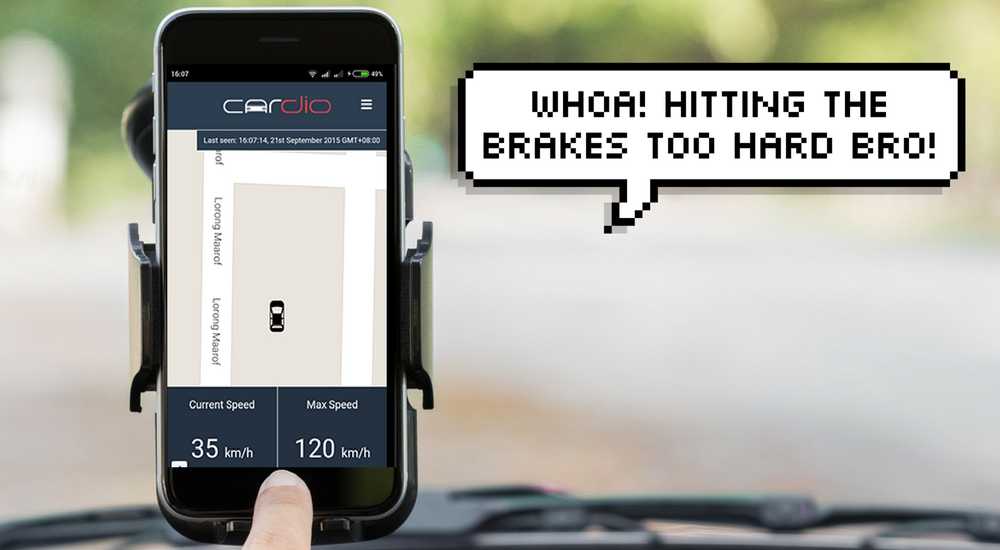The startup scene has been bitten with the IoT bug lately here in Malaysia, with more companies emerging with their own interesting little niches that brings us one step closer to the machine takeover from human operators.
The premise for this startup is simple: If humans can wrap a wearable around their wrist to check their health status, you should be able to attach a small gadget to achieve the same on your car.
The device is described as the Fitbit for cars and it is a dongle that attaches to any car developed after 1996. Created by Omnimatics Sdn Bhd, the CARdio dongle functions as a tiny mechanic that plugs into cars to continuously check their health.

But Are They Safe?
CARdio is certainly not the first car health checker in circulation, but their call to fame is a little different. According to founder Raj Kissu Rajandran, “Generic vehicle health scanners are technical in nature, spewing raw data from the engine that is alien to most people.”
“Fleet management trackers take this a step further, making sense of this data for consumption by their target audience: fleet owners. The CARdio app is designed with regular car owners in mind, to deliver a more personal experience.”
Raj goes to to state that CARdio complies with CE and FCC electromagnetic standards, though local certification with SIRIM is currently pending. They’re aiming to create a product that is easily accessible and has features that encourages safe driving.
Born From A Place Of Need
Raj has background in software engineering, and has had a hand in numerous startups over 11 years. Now running his own startup, he retains a clear passion despite the difficult hours, thanks to the people he meets and work with along the way.
“I had prior industry experience in a way. One of the startups I had been working for built asset tracking software for aviation. All these things helped turn CARdio into a viable business,” said Raj.
The idea for the vehicle fitness tracker came about in 2015, when he quit his job and drove for GrabCar and Uber while he soul searched for the next move in his life.
“As I was driving more often, the need to keep my car in tip-top shape after its warranty expired propelled me into researching cars and their underlying technology,” said Raj.
“While that got the idea brewing, it was that one fateful day when I almost crashed my car because of bad maintenance that ultimately made me decide to pursue the idea to fruition. Within a week, I had pitched my idea to Watchtower and Friends and secured pre-seed funding shortly after.”
Raj then became the solo founder to the whole project that places strong importance for both hardware and software.
“There’s less room for error with hardware, as it does not have the flexibility of change that software startups are used to. Also, most investors in Malaysia tend to shy away from hardware startups given the longer time to market and the higher risks it presents—even more so when it is backed by a solo founder—so fundraising was a lot harder than expected.”
Pulling Out All The Necessary Car Specs

Inspired by Raj’s close call, the CARdio device can detect and send information like mileage, vehicle health, fuel economy and driver habits up on a cloud that can be accessed on both app and browser.
“In addition to vehicle tracking and movement alerts as an anti-theft deterrent, we gauge driving behaviour so users of our platform know how they and their family are driving, in the hopes that this will help them drive safer and improve overall public road safety,” said Raj.
CARdio notifies drivers when they swerve, hit brakes hard, or even accelerate quickly during a drive to hopefully encourage them to amend their bad driving behaviours.

The device is portable, and plugs into a car’s onboard diagnostic port, which means it does not require major rewiring to plug in.
When asked about how the device is able to detect all of this information, Raj tells us that they are leveraging on technology that has been around since the late 90s, and according to Raj, “has seen widespread adoption since”.
The CARdio team currently has ties with APM Automotive Holdings Berhad, Auto Parts Assembly Division of the Tan Chong Motor Holdings, for their efforts.
“We are able to pull diagnostics information from the on-board computer. Coupled with other sensors, the device transmits data to our platform in the cloud to generate actionable analytics such as mileage, fuel consumption and driving habits. This information could then be shared with an actual mechanic to provide further assistance.”
One thing we found out while doing a bit of research for this article—it’s very hard to Google them based on their name (unless you search something like “Cardio Malaysia car diagnostics”). Raj told us that it is easier to find them through their company name, Omnimatics that will link to their site.
Prices are currently TBA as the team is still revising the pricing model at the time, but Raj stated that it will be priced competitively when it launches later this year. The team also indicated an interest in eventually pursuing CARdio as a corporate option, like how Katsana has pivoted.
Feature Image Credit: truuber.com












